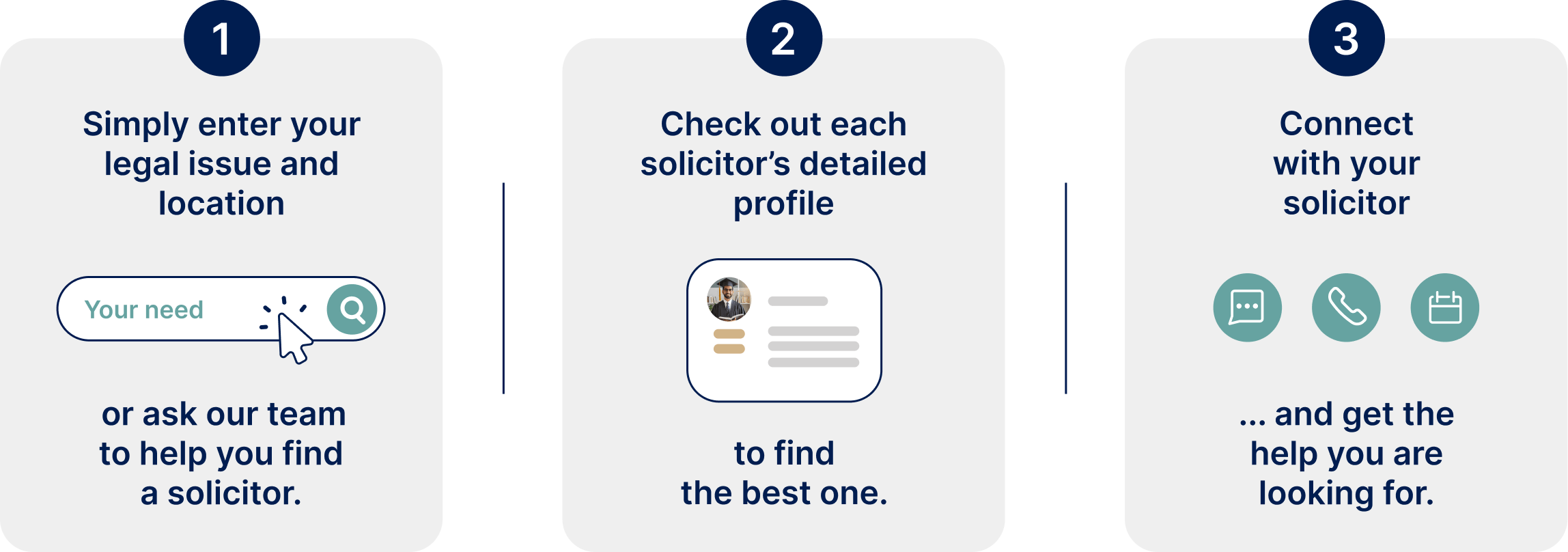
SBP Law
London






London

Stockport

Chislehurst

London

Searching for a solicitor on Qredible is completely free for both individuals and professionals. Additionally, Qredible does not take a commission on any payments made to your solicitor.
Finding the right solicitor for your legal needs can be difficult.
Here is a list of criteria to help you narrow your search:
Solicitor fees are set by the individual solicitor or firm, and are subject to the Solicitors Regulation Authority's (SRA) Price Transparency Rules. You should request more information about fees and payment terms when you first get in touch with a solicitor. Solicitor fees may vary so they should always give you an estimate to approve and keep you updated during the process in case any additional costs need to be included. The final bill should include a full breakdown of the amount charged and what work has been done.
Charges may include:
If you do not qualify for legal aid but need help paying for a solicitor, there are several other options to explore:
1. No Win, No Fee Agreements: Common in personal injury and employment cases, where the solicitor only gets paid if you win, taking a percentage of the compensation. 2. Pro Bono Services: Some solicitors or charities like LawWorks or the Bar Pro Bono Unit offer free legal support for those in need. 3. Payment Plans: Many solicitors offer instalment payment options. 3. Opposing Party Costs: In some civil cases, the court may order the losing party to cover your legal fees. 4. Trade Unions: Members may receive free or discounted legal assistance for workplace issues. 5. Insurance Policies: Check if your home, car, or credit card insurance includes legal expenses coverage. 6. Charitable Organizations: Groups like Citizens Advice, Shelter, or Refuge provide assistance for specific issues like housing or domestic violence. 7. Third-Party Litigation Funding: A third party covers your legal costs in exchange for a share of your award if you win. 8. McKenzie Friends: Low-cost or free support in court, though they cannot act as a solicitor. 9. Crowdfunding: Platforms like GoFundMe can help you raise funds for legal fees.
We suggest you explore these options to find the right support for your legal needs.
Différents domaines de droit existent dans le droit français : vous avez sûrement déjà entendu parler du droit du travail, du droit de la famille ou du droit des affaires. Certains droits sont suffisamment explicites pour en comprendre le périmètre, tandis que d’autres, moins communs, traitent de domaines parfois plus complexes.
1. Family Law: Covers matters like divorce, child custody, financial settlements, and domestic abuse. 2. Employment Law: Deals with workplace issues such as unfair dismissal, discrimination, and redundancy. 3. Housing Law: Relates to landlord-tenant disputes, eviction, repairs, or homelessness. 4. Criminal Law: Applies if you are accused of a crime or need to report one. 5. Civil Law: Includes disputes like breach of contract, property disagreements, or negligence. 6. Personal Injury Law: For accidents, medical negligence, or harm caused by others. 7. Immigration Law: Covers visas, asylum, or residency issues.
If you're unsure, you can access the full list of practice areas.
You can also consult with a solicitor to clarify the area of law relevant to your case.
If you do not qualify for legal aid but need help paying for a solicitor, there are several other options to explore:
1. No Win, No Fee Agreements: Common in personal injury and employment cases, where the solicitor only gets paid if you win, taking a percentage of the compensation. 2. Pro Bono Services: Some solicitors or charities like LawWorks or the Bar Pro Bono Unit offer free legal support for those in need. 3. Payment Plans: Many solicitors offer instalment payment options. 3. Opposing Party Costs: In some civil cases, the court may order the losing party to cover your legal fees. 4. Trade Unions: Members may receive free or discounted legal assistance for workplace issues. 5. Insurance Policies: Check if your home, car, or credit card insurance includes legal expenses coverage. 6. Charitable Organizations: Groups like Citizens Advice, Shelter, or Refuge provide assistance for specific issues like housing or domestic violence. 7. Third-Party Litigation Funding: A third party covers your legal costs in exchange for a share of your award if you win. 8. McKenzie Friends: Low-cost or free support in court, though they cannot act as a solicitor. 9. Crowdfunding: Platforms like GoFundMe can help you raise funds for legal fees.
A Conditional Fee Agreement (CFA) is a legal funding arrangement commonly referred to as a "no win, no fee" agreement. Under a CFA, a solicitor agrees not to charge you their usual fees if your case is unsuccessful. However, if you win your case, you will pay their fees plus a success fee, which is an additional amount to compensate them for the risk of not being paid if the case was lost.
CFAs can provide access to justice without the burden of upfront legal costs. However, it’s essential to fully understand the agreement terms before proceeding.


Our marketing and communication experts are dedicated to helping you enhance your online presence and grow your visibility on social media.
With over 18,000 connections to solicitors facilitated on our website each month, receive client inquiries that match your legal practice area.

